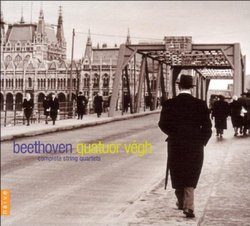| All Artists: Ludwig van Beethoven, Végh Quartet Title: Ludwig van Beethoven: Complete String Quartets - Végh Quartet Members Wishing: 1 Total Copies: 0 Label: Valois Release Date: 3/13/2001 Album Type: Box set, Import, Original recording reissued Genre: Classical Styles: Chamber Music, Historical Periods, Classical (c.1770-1830) Number of Discs: 8 SwapaCD Credits: 8 UPC: 713746199524 |
Search - Ludwig van Beethoven, Végh Quartet :: Ludwig van Beethoven: Complete String Quartets - Végh Quartet
 | Ludwig van Beethoven, Végh Quartet Ludwig van Beethoven: Complete String Quartets - Végh Quartet Genre: Classical
|
Larger Image |
CD Details |
CD ReviewsWho cares about the recording quality? Harley Cardinal | Winnipeg, Manitoba Canada | 03/09/2002 (5 out of 5 stars) "Anyone who would deter a potential buyer from purchasing this set on the basis of imperfect recording(slightly bottom-heavy) or extraneous noise is surely missing the point. These are performances of the highest rank, and to overlook them because of such shallow reasoning would be a mistake. Every note of these quartets is considered, and Sandor Vegh leads with a musical intelligence that remains unsurpassed. The opus 18 quartets are played with the vitality needed for young Beethoven, headstrong and bursting with ideas. Opus 59 and 74's colossal rhythms are portrayed with verve, if not the biting tone some other ensembles use. But the late quartets are where they really shine. Often described as other-worldly, these quartets have never sounded more honest, or more achingly human than played by the Vegh here. If one must nitpick, the only fault in the playing is the occasional off note or lack of polish. However, these are minor quibbles. They are my first choice among the Beethoven cycles and the Vegh stand alongside the Busch Quartet as the greatest(in this reviewer's opinion) interpreters of the most profound works in chamber music." Overrated Scott E. Peterman | Oneida, NY USA | 01/14/2008 (2 out of 5 stars) "Along with his violin sonatas, the string quartets of Beethoven are my favorite pieces of music, and I have been listening to them for decades. I own 17 complete sets of recordings of those quartets and base my opinions of those recordings largely on how closely they represent the character of the man who created them. Regarding the Vegh's performances, I have to disagree with Ms. Gerber. Discounting the fact that the recorded sound of this set is among the worst I have heard, I find Vegh's approach laborious and plodding with less than ideal intonation; Beethoven would not have approved. Reviewers of these performances frequently slip into the error of equating slowness of tempo for "depth" or "insight." For example, the first movement of the Op.127 is marked "Maestoso - Allegro" (Majestic or grand - cheerful , quick). Vegh's approach lacks majesty and drive, and simply does not "dance." Vegh's timing is 7:12. Interestingly, Vegh's 1952 recording also times out at 7:12. Better performances by the Bartok, Hungarian, Tokyo, & Yale quartets time out at 6:27, 6:26, 6:34, and 6:31 respectively - and they dance. Michael Steinberg's notes on Op.127 describe how the key of E-flat major was for Beethoven often a key of "grand rhetoric and emphatic gestures" and he states, "the majestic declamation of the first measures of Op.127 is one of his typical E-flat openings in the tradition of the Eroica and the `Emperor' Concerto. The call to attention in a spacious tempo and the neutrality of the material suggest the traditional slow introduction; the passage, however, dissolves into the Allegro much too quickly for that." Vegh's translation simply fails. I have for some time felt that the Vegh performances of these quartets have been highly overrated by reviewers. Performances by the Bartok, Hungarian, Tokyo, and Yale Quartets are more appealing, truer to the intent of the composer, and better recorded. " Probabely the best . B. Gudgeirsson | Reykjavik Iceland | 01/03/2006 (5 out of 5 stars) "Anyone intersted in the music of Beethoven should not let this interpretation of the Quartets pass them by. In my opinion , it far surpasses any other. It is almost on a " Furtwaenglerian " level.
The forward recording of the cello, mainly heightens the intensity and utmost musicality of the ensemble. With Vegh , primus inter pares. Birgir Gudgeirsson." |

 Track Listings (8) - Disc #1
Track Listings (8) - Disc #1